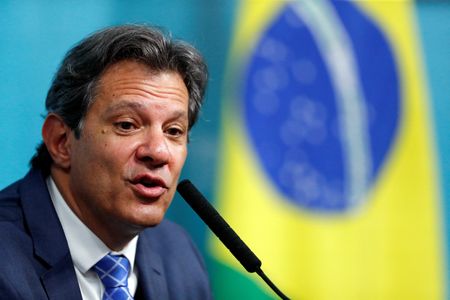SAO PAULO (Reuters) -Brazil’s Finance Minister Fernando Haddad said on Monday that the new central bank monetary policy director could be tapped from the private sector, a closely followed position that should signal the president’s relationship with policymakers.
Speaking to journalists after attending an event hosted by Fiesp industry association, Brazil’s biggest industry association, Haddad said the issue was discussed with central bank governor Roberto Campos Neto in a morning meeting.
“If you want good technical names, you have few places to look, so it can be from the private sector, it can be from the public sector,” said Haddad.
Bruno Serra’s mandate as head of monetary policy expires as soon as next month. His area is considered one of the most critical as it provides essential inputs for monetary policy decisions and is responsible for the foreign exchange and interest rate desks.
Under a formal autonomy Congress approved in 2021, Campos Neto will remain in office until December 2024. His current directors’ mandates will expire in different timeframes up to 2025, and it will be up to leftist President Luiz Inacio Lula da Silva to appoint all members of the bank’s nine-member board.
Haddad said he had committed with Campos Neto to unloading all paralyzed central bank credit initiatives, without giving further details.
He also cited eight proposed bills already in Congress that are “ready to be forwarded,” including one that modernizes guarantees for bank credit and should be voted on shortly in the Senate.
The minister, who insisted on the importance of consumer credit as an economic activity booster, predicted the popular Pix instant payment system would become a credit instrument this year.
He also said he favored a differentiated treatment to encourage companies and guarantee new players’ entry into the credit market. Still, he mentioned the high level of Brazil’s benchmark Selic interest rate – currently at 13.75% – as an “obstacle.” The central bank meets this week to make its policy decision.
“Obviously, we have the Selic issue, which is an obstacle for all of us. You can reduce the lending spreads, improve the guarantee system, but the Selic will always be an obstacle to a consistent reduction in interest rates and the democratization of credit,” he said.
Haddad stated that he will work toward a “virtuous balance” of the exchange rate and interest rates in the short term.
He defended a national reindustrialization that takes climate change into account, stressing that gas could play a role in accelerating the energy transition process that is being planned, as the government has “a lot of interest” in pre-salt gas.
By calibrating state-ruin oil company Petrobras’s pricing policy, ethanol would have a “natural development,” he added.
(Reporting by Marcela Ayres in Brasilia and Andre Romani in Sao Paulo; Editing by David Gregorio and Jonathan Oatis)

